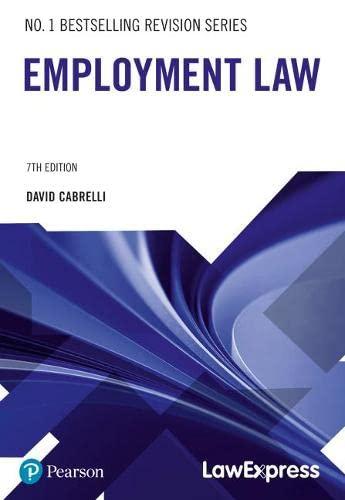Question
Byers acquired and owned substantial tracts of ranchland, including the family ranch where Byers lived. For some time, Byers' son (and, thus, Bouton's brother) managed
Byers acquired and owned substantial tracts of ranchland, including the family ranch where Byers lived. For some time, Byers' son (and, thus, Bouton's brother) managed most of the ranching operations. In 2003, Byers became concerned about his son's conduct and how he was handling some of the business matters entrusted to him. Byers asked Bouton, his daughter, to help in assessing the status of the operations. At the time, Bouton held a tenure-track teaching position on the Washburn University School of Law faculty and earned about $100,000 a year. Bouton began helping Byers with the ranching enterprise. She went to the ranch several times a week and wrapped work on her father's business around her teaching duties. In late 2003, Byers showed Bouton a revised will and trust he had prepared leaving the ranch operations to her. According to Bouton, Byers said he wanted her to carry on the ranching business after his death. After two years, Byers convinced Bouton to quit her law professor job, move her family to the ranch, and run the business full time. He assured her that she needn't worry about money because he was bequeathing her land worth more than a million dollars. In December 2008, the two argued over issues related to the ranch, and Byers told Bouton her services were no longer needed. The family left the ranch and Bouton returned to the Washburn Law School faculty in a part-time teaching position without any possibility of tenure. About 14 months later, Byers informed Bouton that he had contracted to sell the family ranchthe last of his land holdings except for 10 acresfor $1.2 million. So far as Bouton understood, Byers no longer owned any land that she might inherit. In November 2011, Byers signed a new trust that upon his death would distribute all of his assets to charitable foundations to provide college scholarships. Byers effectively disinherited Bouton.
Bouton sued her father, Byer, to enforce his promise that she would inherit the family farm, worth over $1 million. On what legal theory did Bouton sue? How do you think the court resolved the matter? [Bouton v. Byers, 50 Kan. App. 2d 34, 321 P.3d 780 (2014)].
THIS IS THE CASE AND NEED THE BELOW ANSWERS BRIEFLY
1) Explain the phrase: "promissory estoppel can be used as a substitute for consideration."
2) What are the elements plaintiff must prove in a lawsuit for application of this legal doctrine?
3) What was the result on appeal of theBoutonv.Byers case?
4. Discuss some of the facts that Bouton (the daughter) used to support her case.
5. In your opinion, was this case decided correctly by the Court of Appeals of Kansas?
Step by Step Solution
There are 3 Steps involved in it
Step: 1

Get Instant Access to Expert-Tailored Solutions
See step-by-step solutions with expert insights and AI powered tools for academic success
Step: 2

Step: 3

Ace Your Homework with AI
Get the answers you need in no time with our AI-driven, step-by-step assistance
Get Started


